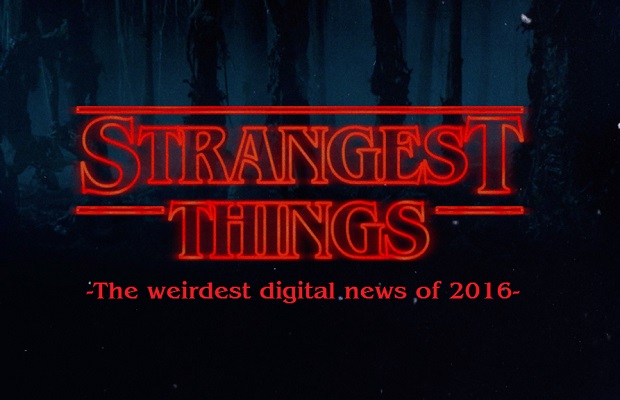From talking cat collars to robot marketers, technology took us in some strange directions during 2016. In this brave new world of emoji keyword targetting and smart pigeons, we celebrate the weirdest news of the year.
Japanese agency hires AI bot as creative director
In March 2016, McCann Erickson Japan became the first agency to appoint a robot as its creative director. The robot, called AI-CD ß, was assigned as a creative director to client accounts and provided creative direction for commercials. It also evaluated and gained learnings from results after commercials aired, to ensure it improves for future projects.

Emojis become keywords: Twitter to let brands target ads by user’s emojis
The ‘winky face’ is set to become the new keyword, as Twitter starts letting brands target ads based on the emojis people use. Under the new scheme, brands can push ads to people based on their use of sentiment, food, and passion emojis.

City AM hands over website control to brands
In a daring move, free London newspaper City AM let brands post articles directly into their website content management system with no editorial control. The move takes the concept of native content (sponsored posts that look just like regular articles) to the next level.The advertisers’ contributions will not be edited by City AM’s editorial team. Brands taking part will be charged an undisclosed monthly fee for a package, and their name will appear at the top of what will be regarded as their home page.

Smart pigeons to measure London pollution levels
A designer in London has come up with a natural way of deploying internet of things (IoT) pollution sensors… using pigeons. Created as part of a project called Pigeon Air Patrol, the connected sensor is then able to inform the public of its findings through the pigeon’s own Twitter account, which will also respond when asked by residents what the readings are in their area.
Introducing the #PigeonAir patrol team: Norbert, Coco and Julius. At your service! pic.twitter.com/N1vg5tZZak
— Pigeon Air Patrol (@PigeonAir) March 14, 2016
Lost in translation: Why the ‘grimace’ emoji is confounding texters
When is a smile not a smile? The different ways that phones display emojis is leading to some embarrassing mix-ups, according to new research. The study, from the University of Minnesota’s GroupLens Lab, indicates that people have very different interpretations of the same emoji, especially when they show up differently on different phones. The issue is that Unicode, the computer industry standard for characters and text, now recognises more than 1,000 different emoji. It provides a code and description of each emoji, but not an actual picture.

Shades of Grey: Google’s AI writes sad poetry after reading romance novels
Google’s AI has been set loose on 11,000 unpublished books, including 3,000 steamy romance titles, in a bid to produce more naturalistic sounding vocabulary. As a result, the machine produced some surprisingly abstract and melancholy poetry.

Mars reveals ‘talking’ cat collar
Forget smart cars – how about smart cats? This new talking feline translation collar from Mars Petcare is real (and not a belated April Fool’s joke). The Catterbox collar was developed by Mars’ Temptations Lab as a fun project which can ‘translate’ cat vocalisations to a human voice. A team analysed cat vocalisations and associated them with equivalent human emotions.
Prototypes of the collar have been launched in the US and New Zealand.
Gordon Bennett! Swear words in email subject lines increases open rates by 28.6%
Brits are almost 30% more likely to open an email if the subject line includes ‘old fashioned’ swear words, according to new research. Brits responded well to swearing in the subject line opening 27% of emails, compared to only 17% being opened in America. Brits responded best to ‘old fashioned’ swear words, such as ‘numpty’ which increased open rates by 26%.

KFC partners Baidu for robot powered store in China
Chinese internet giant Baidu and KFC have teamed up to launch a concept store in Shanghai that uses conversational robots as servers. Called ‘KFC Original+’ the restaurant will demonstrate the voice interaction, smart food-ordering and holographic projection capabilities of Baidu’s robotic personal assistant Duer.
Alibaba lets VR shoppers pay via nodding
Chinese ecommerce giant Alibaba is working on a new payment method that lets shoppers wearing virtual reality headsets make payments without removing the devices. Called VR Pay, the service allows people to select items for purchase from virtual shopping malls simply by looking and nodding at them.

Google’s latest robot butler does the dishes
Boston Dynamics’ latest robot appears to be designed to help in the kitchen, with the ability to load a dishwasher and walk up stairs. The robotics business – which is owned by Google’s parent Alphabet – has created a dog-themed machine that replaces the liquid-powered pistons of earlier designs with an all-electric system.
AI robot teaches uni students for 5 months… and no-one noticed
Jill Watson was been a teaching assistant (TA) at Georgia Institute of Technology for months, responding to student’s emails and forum messages. But there’s a twist: Jill was a robot, powered by IBM’s Watson system. Students said her emails seemed casual, personal, and to-the-point. Researchers behind the project said the experiment was created because overworked TAs generally spend too long responding to email questions.

Want more reviews of the year? See our round-up of the best virals, worst fails and weirdest news below:
The 12 Worst Marketing Fails of 2016




